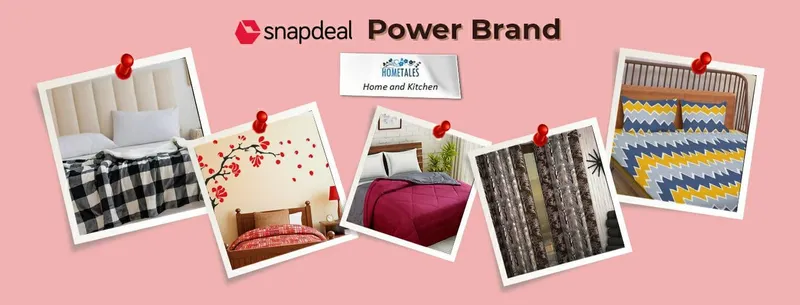
Snapdeal
View Brand PublisherBuilding for Bharat: Snapdeal’s ‘Power Brands’ programme is a win-win for all
With its exclusive focus on the value segment, Snapdeal’s Power Brands programme works with sellers and manufacturers to augment the supply of good quality, affordably priced products that Bharat is looking to buy.
Propelled by cheap data and affordable smartphones, online shopping has been growing rapidly in India over the last few years making deep inroads into each nook and corner of Bharat. Starting with connect and content, users have quickly expanded their engagement to online commerce. Similar journeys have played out in many markets, including in the US and China leading to a sharp and sustained rise in e-commerce adoption.
Although online shopping in India was on the rise prior to COVID, many value-conscious consumers still relied on their neighbourhood markets to meet their regular lifestyle shopping needs, such as daily wear fashion, home products, etc. But as the pandemic struck and work-from-home became the norm, e-commerce adoption increased rapidly. Naturally, the huge base of these value-conscious buyers moved to online shopping. Today, this segment of shoppers presents immense opportunities in the e-commerce sector. In a recent report, Kearney estimated that the value lifestyle e-commerce segment will grow from $4 billion in 2019 to $20 billion in 2026 and $40 billion in 2030.
Nearly 75 percent of Snapdeal’s orders come from Bharat - Tier II and III cities, where a large chunk of value-conscious customers reside. With its 2.0 strategy, has built a distinctive set of competencies to serve customers who are value-oriented rather than brand-centric.
The world of e-commerce has traditionally been dominated by big brands, which offer predictable quality, but at high prices. Users who shop on a budget also desire equivalent comfort in their purchases. How does Snapdeal fill this gap for value buyers online? By systematically blending the two most important criteria for a value-shopper - quality and price.
Snapdeal sees an opportunity in aggregating supply of affordable, good quality merchandise and marketing them under brands created by Snapdeal. To do this in a structured and scalable way, the value e-commerce company has created a ‘Power Brands’ programme which carries out a range of activities starting with sharing consumer insights with sellers and manufacturers, providing guidance on product features sought by users, and product packaging good practices. All these efforts, done collaboratively with sellers, help aggregate relevant merchandise in the affordable price bands, and add more product options on the platform.
India’s value-conscious buyers
While the 2010s have been about getting affluent users from metros and Tier I cities to shop online, the 2020s are about the rise of mid to low-income, value-conscious users from urban areas, tier II-IV cities, and from rural India. Buyers from this cohort focus on finding affordable products that meet their needs of desirable quality, durability, and trendiness. This growing number of value-conscious online shoppers is reshaping India’s e-commerce landscape. The distinctive shopping behaviors and needs of these consumers have led to the rise of value e-commerce - differentiated business models optimised to serve the needs of value-conscious online customers
What are Power Brands
Under its ‘Power Brands’ programme, Snapdeal has built more than 10 brands across popular categories like apparel, fashion accessories, footwear, home and kitchen, health and wellness, personal grooming, etc.
While these brands have been developed by Snapdeal, they are licensed to a select network of sellers on the basis of their capabilities to consistently offer good quality products at affordable prices. Snapdeal owns the brand IP, and the sellers and manufacturers – who sell under the brand name own and manage the inventory on their own.
The brands and the brand standards are designed to help the sellers to better align with the customer expectations for product quality, latest and relevant features, trendiness, look and styling, product packaging etc. The platform network offers live input and feedback from the customers which helps to evolve the product design, quality and price points under the Power Brands.
Snapdeal uses data sciences and technology to capture and understand the preferences and needs of a wide heterogeneous customer base through their online behaviour. The customer-centricity helps Snapdeal to offer products desired category nuances that were otherwise not available to value shoppers. For example, ‘Hometales’ is a popular Snapdeal’s Power Brand for home and kitchen products, which based on consumer insights, also offers plus-sized bed covers to cater to non-standard sizes.

Building what Bharat needs
The programme connects local manufacturing expertise to consumer insights, be it designing wallets with large coin pockets, fast charging cables, or quick-drying fitness shirts like you find in top sports brands, while simultaneously focusing on building a brand to help drive the demand, with marginal capital investment.
Within a short period of less than a year, Snapdeal's portfolio of Power Brands has grown rapidly. Merchandise offered under Power Brands tend to get good customer ratings and reviews and experience and have lower returns. This further encourages other shoppers to explore the brands and buy the products and also has more sellers looking to participate in the programme.
The good feedback received for products offered under Power Brands is a great indicator that these brands are addressing the needs of the value-conscious buyers.
The demand for Power Brands is growing within various categories and this is expected to scale up significantly as Snapdeal expands the products, categories, and number of sellers that it works with.
In the long run, the programme will help to create home-grown, highly marketable Indian brands that aggregate a supply of good quality merchandise manufactured by an unorganised sector that meets the needs of customers.
Benefiting both buyers and sellers
Snapdeal understands that countless MSMEs have strong capabilities in manufacturing or sourcing, but expanding their reach and access to newer markets continues to be a challenge. This is compounded by the need to build brands in order to stand out and build consumer loyalty. Snapdeal’s Power Brands provide ready access to well-designed brands that are aligned with user needs. With zero brand development costs, sellers can focus on their core competencies of production, sourcing and pricing insights leading to better cost-efficiency.
The programme translates into a plethora of relevant good quality choices for buyers, with prices that are pegged to functional value and not to brand premiums. This also provides buyers a predictable experience on price range, quality, features and styling.
Power Brands is designed to help strengthen and organise ecosystem for value sellers in the country. Its collaborative approach to working with sellers and manufacturers avoids the pitfalls that may arise or may be perceived to arise when marketplaces develop their own private labels.
As an asset-light model that aligns the interests of sellers, buyers, and the platform, Snapdeal is committed to growing the ‘Power Brands’ portfolio by working collaboratively with small and medium enterprises and empowering them with marketing and branding support and consumer insights.







